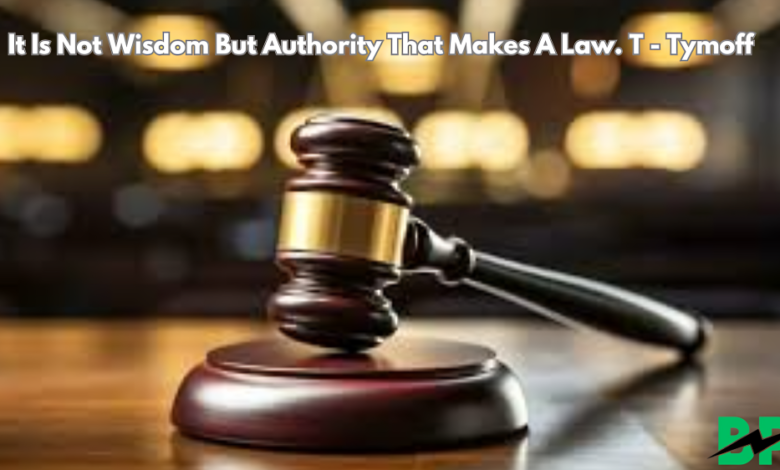It Is Not Wisdom But Authority That Makes A Law. T – Tymoff

In today’s rapidly changing world, the meaning and nature of laws are under constant debate. One famous statement, attributed to Tymoff, reads: “It Is Not Wisdom But Authority That Makes A Law. T – Tymoff” This quote suggests a profound perspective on the origins and enforcement of law. It implies that laws are created and maintained not necessarily because they are wise or morally sound, but because they are enforced by those in power. In this article, we’ll delve into the meaning behind this quote, explore its historical context, and consider its implications for modern society.
Understanding the Quote: “It Is Not Wisdom but Authority That Makes a Law – T Tymoff”
The statement “It is not wisdom but authority that makes a law” speaks to the reality that the creation and enforcement of laws are often rooted more in power than in ethical or intellectual reasoning. Throughout history, laws have been enacted by those who wield authority, rather than by those guided by wisdom. This distinction raises important questions: Are laws inherently just, or do they simply reflect the will of the powerful? Do laws protect society, or do they serve those in positions of influence?
The Role of Authority in Making Laws
Authority plays a critical role in making laws. Laws are implemented by governments, organizations, and leaders who have the power to enforce them. This power enables them to shape society, whether through social norms or legal regulations. In this sense, the quote suggests that authority is the foundation of legal systems, not necessarily moral or intellectual wisdom.
Historical Perspective: Laws and Authority Through the Ages
Historically, authority has always been at the heart of lawmaking. Ancient kings, emperors, and monarchs created laws based on their interests and consolidated power through these laws. Many ancient legal codes, like Hammurabi’s Code or Roman law, were not established out of wisdom alone but as a means for rulers to control society and maintain order. While some ancient laws were undeniably wise, others were strict and harsh, reinforcing the rulers’ dominance rather than protecting the populace’s rights.
Wisdom vs. Authority: Can They Coexist in Law?
The tension between wisdom and authority in law is a central theme in the quote. Ideally, wisdom should guide the creation of laws, promoting justice, fairness, and societal well-being. However, when authority overrides wisdom, laws can be misused or applied unjustly. Understanding this distinction is essential for fostering a society where laws are fair, balanced, and just.
Cases Where Authority Overshadowed Wisdom
Throughout history, there have been many instances where laws created out of authority rather than wisdom led to injustice. Examples include oppressive regimes that impose authoritarian laws to control their citizens. These laws are often enforced not for the benefit of society but to protect the interests of those in power.
- Colonial Laws: Colonial powers often imposed laws on colonies that were designed to exploit resources and suppress the local population. These laws were not created with the wisdom of understanding local customs or welfare in mind but were instead aimed at maintaining authority.
- Discriminatory Laws: In various parts of the world, laws were implemented that segregated or discriminated against certain racial, religious, or ethnic groups. These laws did not reflect wisdom but were created to enforce authority over marginalized communities.
- Totalitarian Regimes: In totalitarian states, laws often serve to suppress dissent and control every aspect of the citizen’s life. Such laws are driven by authority and power rather than ethical considerations or wisdom.
Can Wisdom Influence Lawmaking?
Despite the influence of authority, there have been efforts to make laws based on wisdom, ethics, and justice. For instance, the creation of modern democratic constitutions often involves a deep understanding of human rights, equality, and justice. Laws that protect freedoms, prevent discrimination, and uphold justice are examples of wisdom shaping lawmaking.
The Implications of “It Is Not Wisdom but Authority That Makes a Law”
The quote implies that authority’s influence on law can be both beneficial and harmful. While authority allows for the establishment and maintenance of order, excessive authority can stifle the natural evolution of law toward justice. Therefore, society must work to balance authority with wisdom to ensure that laws serve the greater good.
The Role of Citizens in Shaping Laws
In democratic societies, citizens can influence laws through voting, activism, and public discourse. This mechanism allows citizens to challenge laws that may have been implemented solely through authority without the consideration of wisdom or morality. The balance between authority and wisdom can be achieved when citizens and leaders work together to promote laws that are just, fair, and reflective of society’s values.
When Authority Meets Wisdom: The Ideal Scenario
In an ideal world, authority and wisdom work together to create laws that serve society. Laws influenced by both authority and wisdom would reflect the ethical and moral values of the population, leading to a just society where laws serve to protect and uplift rather than to control. Leaders with both authority and wisdom recognize the needs of society and implement laws that foster equality, justice, and peace.
Authority, Wisdom, and the Future of Lawmaking
As we look to the future, the relationship between authority and wisdom in lawmaking is likely to remain complex. Technology, globalization, and changing societal norms all impact how laws are created and enforced. For a better society, it is essential to strive for laws that incorporate both the wisdom of ethical principles and the authority necessary for implementation.
Modern Legal Systems: Balancing Authority and Wisdom
Many modern legal systems strive to balance authority and wisdom. Courts and legal frameworks allow for checks and balances, helping to mitigate the risk of unjust laws. By allowing public opinion and ethical reasoning to influence law, societies can ensure that authority is used responsibly and that wisdom is given a voice in the lawmaking process.
FAQs
Q: What does “It is not wisdom but authority that makes a law” mean?
A: This quote suggests that laws are created and enforced not solely based on wisdom or moral reasoning but often through the power held by authorities. It highlights the role of authority in establishing laws, sometimes even at the expense of justice or ethics.
Q: Why is authority important in making laws?
A: Authority provides the power to enforce laws, which is essential for maintaining order. However, while authority is necessary for implementing laws, it must be balanced with wisdom to create a fair and just society.
Q: Can laws be wise and authoritative at the same time?
A: Yes, ideally, laws should be both wise and authoritative. When laws are created with wisdom and enforced with authority, they reflect society’s values and promote justice, leading to a balanced and well-functioning society.
Q: How does the concept of authority vs. wisdom apply to modern laws?
A: In modern societies, democratic processes, judicial systems, and public opinion can influence laws, helping to balance authority with wisdom. However, challenges remain, as laws sometimes still reflect the interests of powerful groups rather than the common good.
Q: How can society ensure that laws are based on wisdom as well as authority?
A: Society can promote laws based on wisdom by encouraging public participation, ethical discourse, and fair judicial processes. Education, awareness, and activism play essential roles in pushing for laws that reflect both authority and wisdom.
Conclusion
The quote It Is Not Wisdom But Authority That Makes A Law. T – Tymoff challenges us to consider the foundations of law and the role of power in shaping society. While authority is necessary for creating and enforcing laws, wisdom is essential for ensuring that these laws are just, ethical, and beneficial for society. By understanding the balance between authority and wisdom, we can strive to create a future where laws not only maintain order but also promote justice, fairness, and equality.



